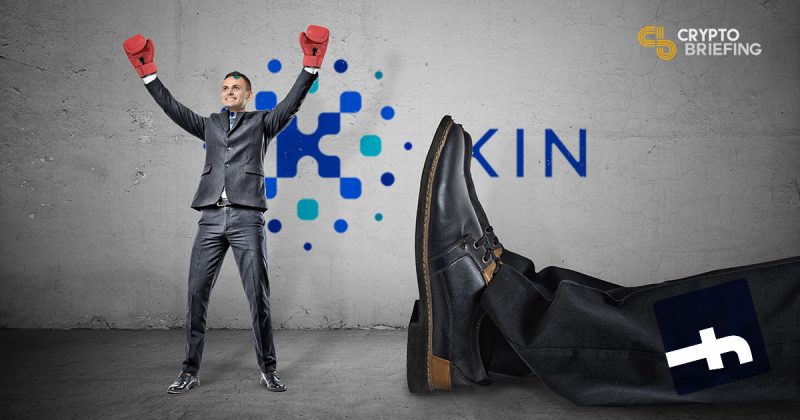
Kin: Cryptocurrency Is How Tech Startups Can Beat Facebook
Tokens are a lifeline to companies that don't want to get snapped up by the tech giants.
Earlier this month Kik released a 130-page filing that accused the Securities and Exchange Commission of “twist[ing] facts” in its lawsuit against the company’s 2017 Kin token sale. The company disputes claims that the 2017 sale of KIN tokens, which raised more than $100M, was a desperate attempt to save the company from ruin, and argues that the regulator is trying to discredit them publicly.
“What really surprised us is just what lengths the SEC went to twist the facts,” Kik CEO Ted Livingstone told CoinDesk. “They cut quotes and [took them out of context] and that’s something we didn’t expect from the SEC.”
What makes the filing so unusual is the tone. No cryptocurrency project has taken such a pugnacious stance against the SEC. Most have submitted meekly, like Airfox and Paragon, which refunded investors without so much as a murmur.
Speaking to Laura Shin earlier this month, cryptocurrency legal specialist Jake Chervinksy subtly hinted that he would not have suggested that legal avenue if Kik had been his clients.
But according to Alex Frenkel, General Manager at Kin Foundation – the non-profit responsible for supporting and growing the ecosystem – the letter came out of a sense of frustration.
Kik had little choice, Frenkel says, because internet companies have nowhere else to go. Cryptocurrencies like Kin represent the only alternative business model that allows them to survive in an increasingly unfair online environment.
“The SEC has an important role,” Frenkel emphasized, “but [the lawsuit] doesn’t make sense.” Tech giants like Facebook, Google, Amazon, Apple and Microsoft – sometimes referred to ominously as ‘the Five’ in Silicon Valley – control the infrastructure, venture firms and ad networks which small companies need to exist.
Companies that don’t play the game, such as Snap, eventually see their businesses taken away from them. The Five love startups, one Seattle Times journalist wrote, “in the same way that orcas love baby seals.”
“Super successful internet platforms cannot compete,” Frenkel said, noting that companies like Soundcloud “can’t even pay their staff anymore.” They face the bleak choice of shutting up shop completely or accepting an offer from one of the tech giants and losing their independence.
“The pain is great,” Frenkel adds. “It definitely isn’t fair.”
Kin is intended as a digital currency for the Kik messenger service, but can also be used by any other company or application. The idea is to create an ecosystem that rewards content creators and companies for contributing to the network, which can then be spent on goods and services within the platform.
Through the Kin Rewards Engine (KRE), developers are incentivised to continue building out the ecosystem with newly-minted Kin. Frenkel says that the company is still trying to encourage more developers to move onto the platform with hackathons hosted all around the world.
The idea behind the Kin token, explains Frenkel, is to reward smaller internet companies and app creators – there are sixty-three active on the platform – directly for their contributions so they can pay staff and bills, as well as fund further operations.
So far the Kin ecosystem hasn’t been greatly affected by the lawsuit. Monthly active earners may have taken a slight dip over the past month, but spenders and ‘tourists’ – users who have moved Kin between apps – are still rising.
Numbers may not have been affected, but Marc Boiron, securities and blockchain lawyer and partner at FisherBroyles, believes that both Kin and Kik are playing a dangerous game. “[R]egulators have not historically shown much sympathy to early-stage companies when it comes to allowing them to ignore regulations,” he said.
Although many smaller companies end up in unsettled regulatory areas to create new products and services, that still comes with inherent risks, one being pushback from the authorities.
“The only other alternative is more growth by the tech giants,” Frenkel adds. The backs of Kik, Kin and the rest of the free internet are against the wall.
That may sound like a battle against Goliath, with Kik in the position of David. But it’s worth pointing out that the giant they’re facing is not Facebook, but the SEC, and the US regulator may offer a tougher challenge.
